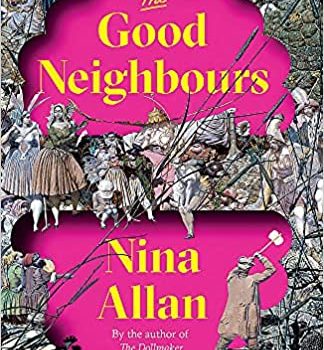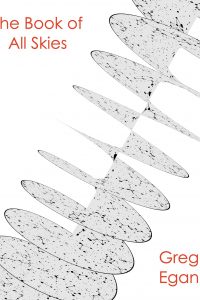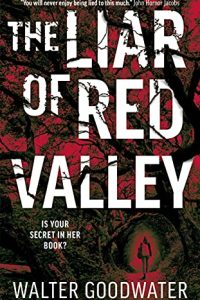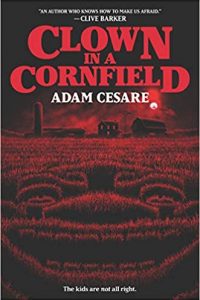Ian Mond Reviews The Good Neighbours by Nina Allan
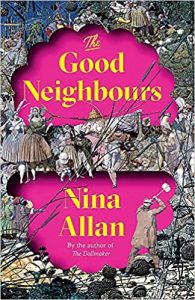 The Good Neighbours, Nina Allan (Quercus 978-1529405170, £16.99, 304pp, hc) June 2021.
The Good Neighbours, Nina Allan (Quercus 978-1529405170, £16.99, 304pp, hc) June 2021.
I remember exactly where I was when I fell in love with Nina Allan’s fiction. I was eating lunch in the work cafeteria, finishing the final story in her first book, The Silver Wind. I recall being in awe of the collection’s bold sense of experimentation, a time-travel narrative told through five interlocking stories that subverted the typical paradox-related clichés by being a profound meditation on the nature of time and identity. This was 2012, so my copy of The Silver Wind was the original version published by Eibonvale Press. Titan Books would later reissue the collection in 2019 with a new novella and additional material, but I never picked it up, so wedded was I to that earlier edition. As I’ve continued to read more of Allan’s work, including her terrific novels (The Race, The Rift, The Dollmaker) and the perceptive book reviews she publishes on her blog “The Spider’s House”, I’ve come to appreciate not only how she interrogates genre tropes – the dystopian, the secondary world, the gothic romance – but the way she plays with structure and form to dissolve the artificial boundary between literary and speculative fiction. That unwillingness to settle on one genre or mode of story-telling is evident in Allan’s latest novel, The Good Neighbours; it’s both a cracking mystery with all the propulsive energy of a true-crime podcast and a fascinating exploration of mental illness and Celtic myth with a hint of the otherworldly.
The Good Neighbours centres on Cath, a wannabe freelance photographer making ends meet working in a record store in Glasgow. Her new project to photograph murder houses (“a reminder that crimes like this can happen anywhere”) sends Cath back, for the first time in a decade, to the Scottish island where she grew up. There she plans to take photos of the house where her best friend Shirley was brutally murdered by her father, John Craigie, along with Shirley’s mother and toddler brother. The property, though, has been purchased by Alice Rahman, a financial analyst from London who has come to the island to escape the anxiety and pressure of her job and a city lifestyle. As Cath begins to dig deeper into why John Craigie killed his family, her blossoming relationship with Alison becomes inexorably linked to the secrets hidden in the murder house and John Craigie’s obsession with Celtic folklore and fairy folk.
First and foremost, The Good Neighbours is a terrific read. It has all the ingredients of a great mystery: a brutal, shocking multiple murder; the killer dead by their own hands; the investigation closed and mostly forgotten until, much later, doubt is cast on the particulars of the case. Similarly, Cath, in the role of amateur sleuth, exhibits several of the hallmarks of the literary detective. She is dedicated, perceptive and stubborn, sticking up a murder wall in her apartment and asking difficult questions of the people who knew John but would prefer not to excavate the past. Of course, Cath is fully aware she’s walked into a true crime story. Her boss, Steve, describes her photography as a form of detective work, and there are multiple references to Sherlock Holmes and popular culture’s depiction of crime investigations. But unlike the old-fashioned gumshoe or detective whose inquiries are hindered by a conspiracy to hide the truth, the obstacles that Cath faces are entirely internal. There’s Shirley’s voice constantly questioning her actions and motives; there are her intense feelings toward Alice, which remain mostly unreciprocated given Alice has no intention of leaving her London-based husband; and there’s Cath’s realisation that her life has been in a state of paralysis since the death of her best friend.
Cath’s state of mind feeds into Allan’s broader discussion about mental illness and creative genius. The discovery of an exquisite, intricately detailed dollhouse built by John Craigie reveals his extraordinary talent with wood. This, coupled with Craigie’s genuine respect and fear of “The Good Neighbours” (fairy folk) – instilled by his grandmother at a young age – leads Cath on a fascinating journey into the lives of English painter Richard Dadd, a paranoid schizophrenic noted for his detailed depiction of fairies, who murdered his father convinced he was the devil, and troubled fictional academic Mabel Konig who held the controversial belief that the supernatural was a result of “quotidian” realities that can only be seen by those with “enhanced, synaesthetic or higher intellectual perception.” To be clear, Allan is not making the broad-brush claim that artistic brilliance will lead to psychosis and acts of violence. On the contrary, and consistent with her fiction over the last decade, Allan is arguing for a reality that is far weirder, more complicated, and less clear-cut than most of us are willing to accept. There’s this bittersweet moment late in the novel where Cath’s curmudgeonly boss Steve opens up about his father, who sadly killed himself but who told his son that even when the world frightened him, “he never stopped seeing the wonder in it either.” That’s how I view The Good Neighbours, a mystery novel that breaks free of its genre conventions and finds the space to show us a world that is terrifying, joyful, and oh so strange.
This review and more like it in the July 2021 issue of Locus.
 While you are here, please take a moment to support Locus with a one-time or recurring donation. We rely on reader donations to keep the magazine and site going, and would like to keep the site paywall free, but WE NEED YOUR FINANCIAL SUPPORT to continue quality coverage of the science fiction and fantasy field.
While you are here, please take a moment to support Locus with a one-time or recurring donation. We rely on reader donations to keep the magazine and site going, and would like to keep the site paywall free, but WE NEED YOUR FINANCIAL SUPPORT to continue quality coverage of the science fiction and fantasy field.
©Locus Magazine. Copyrighted material may not be republished without permission of LSFF.


